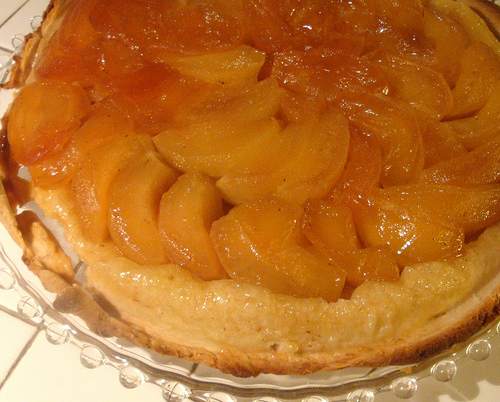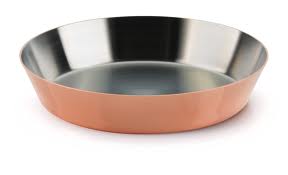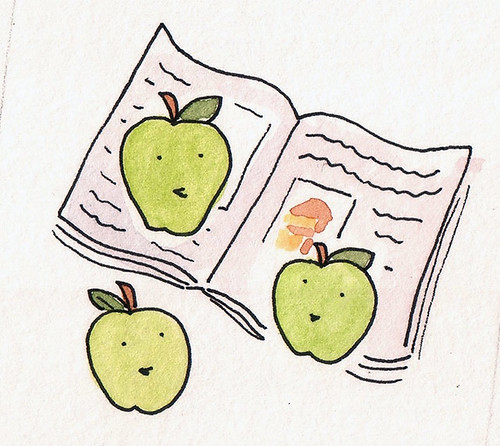 Image via CraftsyI know, sweet readers, that you probably love a sweet story as much as me, so I thought I would tell you the tale of Tarte Tatin.
Image via CraftsyI know, sweet readers, that you probably love a sweet story as much as me, so I thought I would tell you the tale of Tarte Tatin.
To the uninitiated, Tarte Tatin is an upside-down apple tart which is famous in France. It's upside down because it's baked with a slurry of apples, butter, sugar and some spices in a pan, with the pastry bottom on top. After it's baked, you flip the pan, and the yummy gooey stuff drips down on top of the apples to form a caramelly, buttery awesome apple topping on a pastry crust. It's easy and good eating, for sure.
Among its many fine points, it's also largely viewed as a precursor to America's beloved pineapple upside-down cake.
So how did the tart get its start? Well, one thing is for certain: the ones who made it famous in the 1880s were the Tatin sisters, Stephanie and Caroline, proprietresses of the Hotel Tatin, located about 100 miles south of Paris.
How, exactly, the tart was developed depends on who you ask. There are several stories; I'll share a few with you.
Some say that it was a flub where sister Stephanie was cooking some apples on the stovetop and misjudged how quickly they were cooking. To try to chill out the fast-cooking pommes, she tossed a pastry crust on top and tossed the whole thing in the oven to slow the cooking. When she extracted it, the inverted tarte was well-received, and a new classic was born. In another similar variation, she simply forgets to put the crust below the apples so decides to put it on top and bake.
Other versions of the story make out Stephanie as a kitchen novice, accidentally assembling the tart in the wrong order before baking but deciding to go with it. Yet others include an unfortunate incident in which a tart is assembled and soon before baking, is accidentally flipped upside down, but she decides to go with it anyway.
 If you've heard another variation of the story, or a slightly different version of any of the above, I'm not surprised. As I found out while writing my second book, The Secret Lives of Baked Goods: Sweet Stories & Recipes for America's Favorite Desserts
If you've heard another variation of the story, or a slightly different version of any of the above, I'm not surprised. As I found out while writing my second book, The Secret Lives of Baked Goods: Sweet Stories & Recipes for America's Favorite Desserts, many of the stories behind popular baked goods are like playing a game of telephone: they're slightly different depending on who tells the story.
It's also probable that it wasn't an accident at all, but a matter of the baker following baking trends, since it's probable that the concept of upside-down desserts actually preceded the sisters Tatin. In his Le Pâtissier royal parisien, published in 1841, the famed pastry chef Marie-Antoine Carême had already referenced "gâteaux renversées" , or "reversed cakes", made with various fruits.
But to me, this is the most interesting part of the story: it wasn't even the sisters Tatin who made the tarte famous. In fact, it was a matter of word of mouth.
Maurice Curonsky, a French author and gourmand, adorably nicknamed "the Prince of Gastronomy"was the first to famously revere the tart, referring to it in his writing as "tarte des desmoiselles Tatin". To the best of my high school French knowledge, "desmoiselles" is a more kind term than "old maids", but it does refer to their unmarried status. Word of the "tarte Tatin" spread, and this became its nickname--it had not previously been referred to by name like this.
Sealing the tarte's fame was the love of Louis Vaudable, an influential foodie and owner of Parisian restaurant Maxim's. According to the official Tarte Tatin website, Vaudable is said to have written "I used to hunt around Lamotte-Beuvron in my youth, and had discovered in a very small hotel run by elderly ladies a marvelous dessert listed on the menu under tarte solognote. I questioned the kitchen staff about its recipe, but was sternly rebuffed. Undaunted, I got myself hired as a gardener. Three days later, I was fired when it became clear that I could hardly plant a cabbage. But this was long enough to pierce the secrets of the kitchen. I brought the recipe back, and put it on my own menu under "Tarte des Demoiselles Tatin".
As the website continues, however, "Unfortunately, Mr. Vaudable was born in 1902, and the sisters retired in 1906. They died in 1911 and 1917, while Maxim's was purchased by the Vaudable family in 1932." So while it's a cute story, it doesn't quite line up.
Nonetheless, the tarte did appear on the Maxim's menu, and became a popular favorite.
Today, you might not see tarte tatin on restaurant menus with great regularity, but it's a delicious and worthwhile experience to make your own. It's fairly simple--if you've ever made an apple pie, and if you've ever flipped a Pineapple upside-down cake, you're well equipped with all the skills you need.
Regarding apples: The French Calville apple is the specimen of choice for this recipe; however, if you can't find those, try Pippin, Cortland, or Gala apples. Interestingly, some older recipes call for unpeeled apples, though the recipe I suggest calls for Granny smith apples, cored and peeled. I have used Gala when I have made this recipe, but you choose your own bliss. You're not going to be wrong if you use Granny smith.
 Regarding pans: You know, there actually exists a tarte tatin pan. But if you don't want to make the investment...go ahead and use an oven-safe skillet.
Regarding pans: You know, there actually exists a tarte tatin pan. But if you don't want to make the investment...go ahead and use an oven-safe skillet.
Regarding serving: Although old versions call for serving the tarte warm, by itself, go ahead and serve it with ice cream if you wanna (you probably do, right?). You won't regret it.
Want a recipe? I will tell you, I have used the New York Times recipe pretty exactly, so I won't even try to adapt it here--rather, I will give you a link.
Find a recipe for Tarte Tatin here.
Have you ever tried Tarte tatin?

